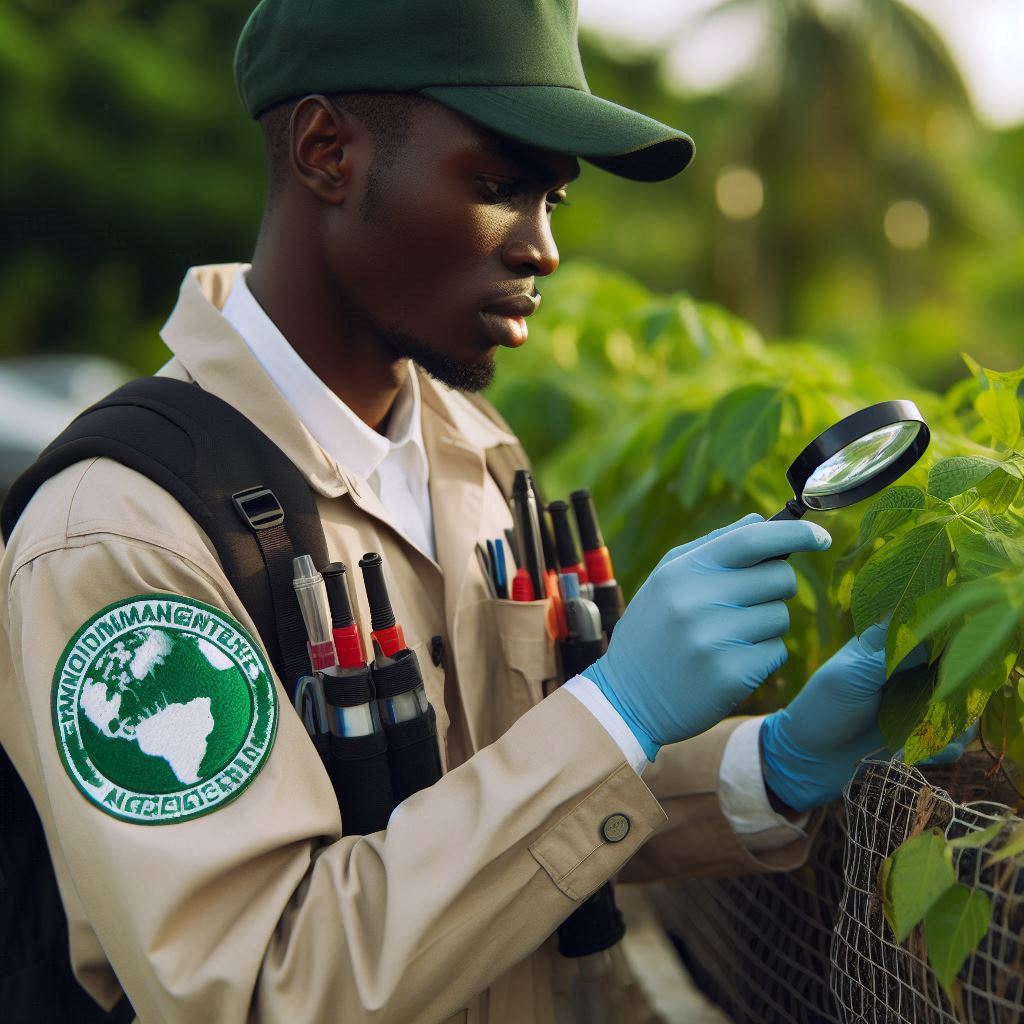Introduction
Environmental studies in Nigeria have evolved significantly, reflecting global concerns about sustainable development and ecological conservation.
As the nation grapples with environmental challenges such as deforestation, pollution, and climate change, the importance of studying environmental issues becomes increasingly apparent.
Nigerian universities play a pivotal role in educating future environmental leaders.
These institutions offer diverse programs that equip students with knowledge and skills to address complex environmental problems.
By fostering research, practical training, and community engagement, universities contribute to sustainable practices and policy development.
Top universities in Nigeria for environmental studies include the University of Ibadan, recognized for its longstanding commitment to environmental research and education.
Ahmadu Bello University in Zaria is known for its comprehensive environmental studies programs, integrating theoretical knowledge with practical applications.
The Federal University of Technology, Akure, offers specialized courses in environmental management, preparing students for careers in environmental protection and resource management.
Choosing a university with strong environmental programs is crucial for students aspiring to make a positive impact on Nigeria’s environmental future.
These programs not only provide academic excellence but also cultivate a deep understanding of environmental issues and the tools necessary to address them effectively.
University of Ibadan
Overview of Environmental Studies Programs Offered
The University of Ibadan (UI) stands as a beacon of excellence in Nigeria, particularly in the realm of environmental studies.
It offers a comprehensive array of undergraduate and postgraduate programs tailored to meet the increasing demand for environmental expertise in the country.
These programs encompass diverse fields such as environmental science, ecology, environmental policy, and sustainable development.
At the undergraduate level, students can pursue Bachelor’s degrees in Environmental Management, Environmental Health Sciences, and related disciplines.
The curriculum emphasizes foundational knowledge in environmental principles, coupled with practical skills in fieldwork, research methods, and data analysis.
Postgraduate students have opportunities to specialize further through Master’s and Ph.D. programs that delve deeper into specific areas like biodiversity conservation, climate change mitigation, and environmental impact assessment.
Faculty Expertise in Environmental Research
UI boasts a distinguished faculty comprising seasoned researchers and experts in environmental science and management.
Faculty members within the Department of Environmental Health Sciences and related departments are actively engaged in cutting-edge research.
Their work spans a wide spectrum, including ecosystem dynamics, pollution control, renewable energy, and environmental policy analysis.
Many professors have published extensively in reputable journals and contributed significantly to global environmental discourse and policy formulation.
Facilities and Resources Available for Students Studying Environmental Studies
The University of Ibadan provides students with access to state-of-the-art facilities and resources essential for comprehensive environmental studies.
The university’s laboratories are equipped with modern instrumentation for analyzing soil quality, water pollutants, and air contaminants.
These facilities support hands-on learning and research activities, allowing students to gain practical experience in environmental monitoring and assessment techniques.
UI’s extensive library resources include a vast collection of environmental literature, journals, and research publications.
This rich academic environment enables students to stay updated with the latest developments and advancements in environmental science and management.
Fieldwork opportunities are abundant, with access to diverse ecosystems across Nigeria. Students engage in field trips, practical sessions, and research expeditions that deepen their understanding of environmental issues and solutions.
Collaborations with governmental agencies, non-governmental organizations (NGOs), and industry partners further enrich students’ educational experiences.
UI facilitates internships, collaborative research projects, and community outreach initiatives that allow students to apply their knowledge in real-world settings.
These partnerships enhance students’ professional skills and broaden their perspectives on environmental challenges and solutions.
Read: Overview of Environmental Management in Nigeria
Obafemi Awolowo University, Ile-Ife
Obafemi Awolowo University (OAU) in Ile-Ife stands as a leading institution in Nigeria, particularly esteemed for its robust environmental studies program.
Description of the Environmental Studies Curriculum
OAU offers a comprehensive and interdisciplinary curriculum in environmental studies. The program covers a wide range of subjects, including ecological principles, environmental management, sustainability practices, and climate change adaptation.
Students engage deeply with topics such as biodiversity conservation, environmental policy, environmental impact assessment (EIA), and sustainable development strategies.
The curriculum is designed to provide students with a solid theoretical foundation combined with practical skills necessary for addressing complex environmental challenges.
Research Opportunities for Students in Environmental Studies
At Obafemi Awolowo University, students benefit from extensive research opportunities in environmental studies. The university encourages and supports student-led research initiatives across various environmental disciplines.
Under the guidance of experienced faculty members, students undertake research projects that explore local environmental issues, biodiversity conservation, water resource management, and more.
This hands-on research experience equips students with critical thinking, analytical skills, and practical knowledge essential for careers in environmental science, policy-making, and advocacy.
Collaboration with Industry Partners for Practical Experience
OAU maintains strong collaborations with industry partners to enhance students’ practical experience in environmental studies.
These partnerships facilitate opportunities for internships, field placements, and collaborative projects with leading organizations in environmental conservation, natural resource management, and sustainable development sectors.
Students gain valuable insights into real-world environmental challenges and solutions, applying classroom learning to practical settings.
By working alongside industry professionals, students also acquire knowledge of environmental regulations, technological advancements, and innovative practices in environmental sustainability.
Obafemi Awolowo University’s commitment to environmental education extends beyond academic excellence.
The university’s collaborations with industry leaders ensure that students receive holistic training and exposure to current environmental issues and practices.
Graduates of OAU’s environmental studies program emerge well-prepared to address environmental challenges in Nigeria and globally, contributing effectively to sustainable development, biodiversity conservation, and environmental stewardship.
Read: Environmental Impact Assessments in Fisheries
University of Lagos
Environmental Studies Department
The University of Lagos (UNILAG) boasts a robust environmental studies department known for its comprehensive and interdisciplinary approach.
The department offers diverse programs, including Environmental Management, Environmental Toxicology, and Marine Sciences.
Faculty members are experts in various fields, contributing to a rich academic environment. They focus on critical issues such as urban sustainability, marine conservation, and pollution control.
UNILAG’s environmental studies curriculum integrates theoretical knowledge with practical skills. Students engage in hands-on learning through laboratory work, research projects, and case studies.
The department emphasizes sustainable practices, preparing students to address Nigeria’s environmental challenges. Faculty members publish widely in top journals and participate in international conferences, ensuring that students receive cutting-edge education.
Internship and Fieldwork Opportunities for Students
UNILAG provides extensive internship and fieldwork opportunities for environmental studies students. Partnerships with governmental agencies, NGOs, and private companies offer students real-world experience.
Internships at organizations like the Lagos State Environmental Protection Agency (LASEPA) and the Nigerian Conservation Foundation (NCF) provide invaluable exposure.
Fieldwork is a crucial component of UNILAG’s environmental studies programs. Students participate in field trips to diverse ecosystems, including coastal areas, wetlands, and urban environments.
These trips offer practical experience in environmental monitoring, data collection, and ecological assessments. Fieldwork enhances students’ understanding of environmental processes and the impacts of human activities.
UNILAG also collaborates with international institutions, providing students opportunities to engage in global environmental research projects.
These collaborations enable students to learn best practices from around the world and apply them to local contexts.
The university’s location in Lagos, a major urban center, provides a unique learning environment with access to urban sustainability projects and coastal management initiatives.
Alumni Success Stories in the Field of Environmental Studies
UNILAG’s environmental studies alumni have achieved significant success in various sectors. Many have become leaders in environmental advocacy, research, and policy-making.
For instance, Dr. Amaka Nwosu, a UNILAG alumna, leads a prominent environmental consultancy firm focusing on sustainable urban development. Her work has influenced environmental policies and urban planning projects across Nigeria.
Another notable alumnus, Mr. Tunde Babalola, works with the Nigerian Conservation Foundation, spearheading community-based conservation projects.
His efforts have led to the successful restoration of degraded ecosystems and increased community awareness about conservation practices.
Many UNILAG graduates have pursued advanced degrees at prestigious international institutions, further enhancing their expertise.
Their global exposure and advanced training allow them to contribute effectively to Nigeria’s environmental sector.
UNILAG’s strong alumni network provides current students with mentorship and career opportunities, fostering professional growth and collaboration.
Generally, the University of Lagos stands out as a premier institution for environmental studies in Nigeria.
Its comprehensive programs, hands-on learning opportunities, and successful alumni make it an excellent choice for aspiring environmental professionals.
By providing a solid educational foundation and real-world experience, UNILAG prepares students to become leaders in environmental sustainability and conservation.
Read: Environmental Biology Conferences and Seminars
Ahmadu Bello University, Zaria
Ahmadu Bello University (ABU) in Zaria stands out as a premier institution for environmental studies in Nigeria. The university offers diverse specializations, an experienced faculty, and significant environmental initiatives that contribute to the field.
Specializations within the Environmental Studies Program
ABU provides a comprehensive array of specializations within its environmental studies program, catering to a broad spectrum of interests and career aspirations.
Students can choose to focus on environmental management, where they learn to develop and implement strategies for sustainable use of natural resources.
Another specialization, sustainable development, emphasizes balancing economic growth with environmental protection and social equity.
Environmental chemistry is another critical area of specialization, where students study the chemical processes that affect the environment, including pollution and its control.
Natural resource management focuses on the sustainable use and conservation of resources such as water, soil, and forests.
ABU also offers specializations in climate change studies, where students explore the science behind climate change and develop strategies to mitigate its impacts.
Environmental impact assessment (EIA) and biodiversity conservation are additional specializations that allow students to assess the environmental consequences of projects and work on preserving biological diversity.
These specializations provide students with in-depth knowledge and skills tailored to their specific career interests, ensuring they are well-prepared for the challenges in their chosen fields.
Faculty Members with Research Focus on Environmental Issues in Nigeria
ABU is home to a distinguished faculty with extensive research experience in addressing environmental issues pertinent to Nigeria.
Faculty members conduct pioneering research on topics such as deforestation, water resource management, pollution control, and sustainable agriculture.
Their work addresses critical environmental challenges, offering valuable insights and practical solutions.
Faculty members at ABU actively publish their research findings in prestigious international journals, contributing to the global body of environmental knowledge.
They also engage in collaborative research projects with both national and international institutions, enhancing the university’s research impact and fostering a rich academic environment.
This collaborative spirit helps bridge the gap between academic research and practical applications, ensuring that ABU’s research has real-world relevance and impact.
Environmental Initiatives and Projects Led by the University
Ahmadu Bello University is deeply committed to environmental conservation and sustainability, leading numerous initiatives and projects that make a tangible difference.
The university spearheads community-based conservation projects aimed at protecting local ecosystems and biodiversity.
These projects include reforestation programs, where students and faculty work together to plant trees and restore degraded lands.
ABU also promotes sustainable agriculture practices that help local farmers increase productivity while minimizing environmental impact.
In the area of clean energy, ABU is involved in projects that promote the use of renewable energy sources, such as solar and wind power, to reduce dependence on fossil fuels. These initiatives not only help mitigate climate change but also improve energy access in rural areas.
ABU’s environmental initiatives extend to education and public awareness. The university organizes workshops, seminars, and outreach programs to educate the public on the importance of environmental sustainability.
These efforts aim to foster a culture of environmental stewardship among students and the broader community. By raising awareness and promoting sustainable practices, ABU helps mitigate environmental degradation and promotes the well-being of local communities.
Read: Role of Fisheries in Nigerian Food Security

Federal University of Technology, Akure
Unique Aspects of the Environmental Studies Program
The Federal University of Technology, Akure (FUTA) offers a unique environmental studies program. It combines interdisciplinary approaches with a strong emphasis on technology and innovation.
The program integrates courses in environmental science, technology, and management, providing a comprehensive understanding of environmental issues.
Students learn to apply technological solutions to environmental challenges, making FUTA’s program distinct.
FUTA’s environmental studies program stands out for its specialized tracks, such as Environmental Management and Toxicology, Environmental Health, and Climate Change.
These tracks allow students to tailor their education to their interests and career goals. The curriculum is designed to address both local and global environmental issues, preparing students to work in diverse contexts.
Hands-on Learning Experiences for Students
FUTA prioritizes hands-on learning experiences, ensuring that students gain practical skills alongside theoretical knowledge.
The university’s state-of-the-art laboratories are equipped with advanced tools for environmental analysis. Students conduct experiments and research projects that provide real-world applications of their classroom learning.
Fieldwork is a critical component of FUTA’s environmental studies program. Students participate in field trips to various ecosystems, including forests, wetlands, and industrial sites.
These field trips offer opportunities to conduct environmental assessments, collect data, and analyze ecological impacts. Fieldwork experiences enhance students’ understanding of environmental processes and human-environment interactions.
Internships provide additional hands-on learning opportunities. FUTA partners with environmental agencies, NGOs, and private sector companies to offer internships that give students practical experience.
These internships allow students to apply their knowledge in professional settings, building valuable skills and industry connections.
Community Engagement and Outreach Activities
FUTA actively engages in community outreach and environmental education. The university collaborates with local communities to address environmental issues and promote sustainable practices.
Students participate in community-based projects that focus on environmental conservation, waste management, and sustainable agriculture.
Transform Your Career with Expert Guidance
Get personalized mentorship consulting that’s tailored to your unique path. Our expert advice is actionable and exclusive.
Get StartedOne notable outreach initiative is the Environmental Awareness Campaign, where students educate local communities about environmental conservation and sustainable practices.
These campaigns involve workshops, seminars, and hands-on activities that raise awareness and encourage community participation in environmental protection.
FUTA also conducts research projects that benefit local communities. For example, students and faculty work on projects related to water quality, soil conservation, and sustainable farming practices.
These projects provide practical solutions to environmental problems faced by local communities, demonstrating the university’s commitment to societal impact.
In closing, the Federal University of Technology, Akure offers a distinctive and impactful environmental studies program.
Its emphasis on technology, hands-on learning, and community engagement prepares students to become leaders in environmental sustainability.
By combining academic rigor with practical experiences, FUTA equips students with the skills and knowledge needed to address environmental challenges effectively.
This makes FUTA an excellent choice for aspiring environmental professionals who are passionate about making a difference.
University of Nigeria, Nsukka
Overview of the Environmental Studies Curriculum
The University of Nigeria, Nsukka (UNN) offers a comprehensive and dynamic environmental studies curriculum.
The program covers key areas such as environmental science, policy, and management. Students receive a strong foundation in ecology, environmental impact assessment, and sustainable development.
The curriculum integrates theoretical knowledge with practical skills, preparing students for diverse careers in environmental fields.
UNN’s environmental studies program emphasizes interdisciplinary learning. Courses span across biological sciences, geography, and environmental management.
This approach ensures students understand the complex interactions between natural and human systems.
Elective courses allow students to specialize in areas like climate change, conservation biology, and environmental toxicology. This flexibility caters to diverse interests and career aspirations.
Research Centers and Labs Available for Students
UNN provides state-of-the-art research centers and laboratories for environmental studies students. The university houses the Centre for Environmental Management and Control (CEMAC).
CEMAC focuses on environmental monitoring, pollution control, and sustainable resource management. Students engage in research projects that address pressing environmental issues.
The university’s laboratories are equipped with advanced tools for scientific analysis. Students use these facilities to conduct experiments on soil, water, and air quality.
Access to modern equipment enhances their research capabilities and practical skills. The Ecotoxicology Laboratory, for example, allows students to study the effects of pollutants on ecosystems.
These hands-on experiences are crucial for understanding and solving environmental problems.
Fieldwork is a vital component of the program. Students participate in field trips to diverse ecosystems, including forests, wetlands, and urban areas.
These trips provide practical experience in environmental assessment and data collection. Fieldwork helps students apply classroom knowledge to real-world situations, deepening their understanding of environmental processes.
Partnerships with Government Agencies for Environmental Research and Policy Development
UNN collaborates with various government agencies for environmental research and policy development. These partnerships enhance the university’s research impact and provide valuable opportunities for students.
The university works closely with the Nigerian Environmental Standards and Regulations Enforcement Agency (NESREA). This collaboration focuses on developing and enforcing environmental standards.
UNN also partners with the Federal Ministry of Environment on several research projects. These projects address critical issues such as climate change adaptation, biodiversity conservation, and waste management.
Students involved in these projects gain exposure to policy development and implementation processes. This experience prepares them for careers in environmental policy and governance.
The university’s partnerships extend to international organizations as well. Collaborations with bodies like the United Nations Environment Programme (UNEP) provide global perspectives on environmental issues.
These partnerships offer students opportunities for internships, research exchanges, and professional networking.
Therefore, the University of Nigeria, Nsukka excels in providing a comprehensive and practical education in environmental studies.
Its robust curriculum, advanced research facilities, and strategic partnerships equip students with the skills and knowledge to address environmental challenges effectively.
UNN’s commitment to interdisciplinary learning and real-world applications makes it an excellent choice for aspiring environmental professionals.
Conclusion
Studying environmental issues in Nigeria holds paramount importance for sustainable development and effective conservation efforts.
Several universities in Nigeria stand out for their comprehensive programs and contributions to environmental studies.
Among the top institutions are the University of Ibadan, renowned for its research in biodiversity conservation and environmental policy.
Ahmadu Bello University offers robust programs focusing on environmental management and sustainable development.
The University of Lagos excels in environmental sciences, emphasizing pollution control and environmental health.
Prospective students aspiring to make a significant impact on Nigeria’s environmental landscape should seriously consider pursuing a degree in environmental studies at these institutions.
Such programs provide not only theoretical knowledge but also practical skills through fieldwork, internships, and research opportunities.
Graduates are equipped to address pressing environmental challenges, from climate change mitigation to biodiversity conservation and pollution management.
By emphasizing the importance of environmental education, universities prepare future environmental leaders who are adept at navigating complex environmental issues and implementing innovative solutions.
Choosing to study environmental issues at these top Nigerian universities not only enriches academic knowledge but also fosters a commitment to sustainable practices and environmental stewardship.




